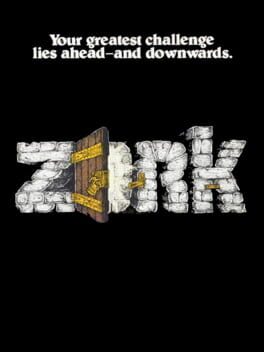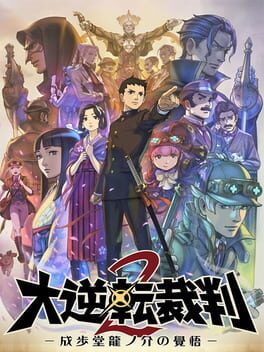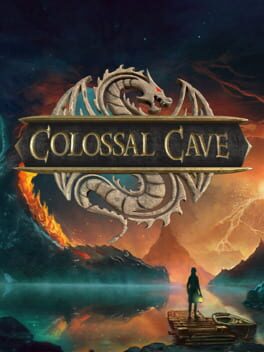DeviousJinjo
Recent Activity
DeviousJinjo is
now playing
Final Fantasy XIV Online
7 hrs ago
DeviousJinjo is
now playing
Zork II: The Wizard of Frobozz
2 days ago
DeviousJinjo
finished
Zork
I wish that I could tell you that Zork is anywhere near the gigantic leap in the history of computer games that much of the world seems to think it is, but I've played Colossal Cave, or Adventure, or Colossal Cave Adventure, or The-Game-That-Did-Most-Of-This-Immediately-Before-Zork. That said, I should admit that prior to now, I'd been selling Zork short. It definitely IS meaningfully different from its predecessor and stands in its own right as one of gaming's critical progenitors.
Zork, unlike Colossal Cave, is not limited to a two or three word text parser and doesn't reduce most item-based verbs down to the word "use." You can even ask it questions, such as "What is a grue?" This is, in my somewhat controversial opinion, both positive and negative. Colossal Cave's limitations force a certain simplicity onto the player's interactions with the world. The player can intuit pretty quickly what sorts of things they can do, and how those commands must be formatted. Zork introduces more complexity, which in my previously more pessimistic read translated to more confusion and a greater tendency toward misinterpretation. The English language is a hot, filthy mess, and given the choice between an ultra-primitive computer program attempting to wrangle that mess in all its complexity like Zork does, and a slightly more primitive program constructing its own clearer, more simplistic language, I, as a 21st century player, am actually inclined to choose the latter.
Having finished Zork 1, I mostly stand by this preference, but I have found the appeal in Zork's more advanced parsing. While it may be more frustrating or overwhelming at times, there's something to be said for the mystery provided by that wider possibility space. The options on any given "screen" of Zork are less apparent, and that can lead to greater creativity on the part of the player. It's exciting to come up with a course of action that would be outside the capabilities of Colossal Cave and see it play out. It's also all the more likely that you'll encounter some generic error text, because the more flexibility you introduce here, the more ridiculous edge cases you burden the author with responding to. If an input produces nothing, it provokes disappointment. If the author tries to respond to every single potential input, it exhausts sanity. In other regards, however, it's an important quality of life improvement. In Zork you don't have to type "get sack" and THEN "get bottle", you can type a single line: "get sack and bottle." More importantly, upon closer inspection I've found that Zork 1 never ACTUALLY demands much complexity of the player at all... it's more just the threat of it that had me digging in my heels. Zork's difficulty has much more to do with its sense of humor and its classic moon logic than anything else, though a more limited option set certainly does help one feel their way out of such things more easily. Colossal Cave has a giant snake that must somehow be defeated by a tiny bird, but with so few verbs and such a limited inventory at that point in the game, trial and error WILL eventually save the day.
In many ways, Zork, or at least Zork 1, still definitely feels to me like a clone of a more inspired game. At the same time, having spent more hours with it, I do think that there is value in Zork's audacious tampering. It develops its tools in an interesting direction, layers on some more interesting prose, and creates something more playful than its inspiration. Zork's parser is genuinely impressive from an early programming perspective, breaking down sentences in an effective and intuitive way. Besides, it's hard to take Zork too harshly to task for basically flat-out plagiarizing Colossal Cave when that still requires replacing all of the puzzles it's made of. I feel it's also worth noting that in 1977, Zork was already more than Zork 1. The original mainframe version of the game basically contained all of Zork 1 and half of Zork 2 before it was organized and inflated into the full trilogy. That Zork 2 content helps a bit more in the originality department, and with this impressive quantity being the case, I find it hard not to toss Zork a few more mental points... especially considering there was so little else going on in the nascent world of gaming in 1977. The fact of the matter is, Zork is still a more enjoyable experience than any other piece of software produced in its year, with some unique strengths that hold up fairly well even to this day.
Zork, unlike Colossal Cave, is not limited to a two or three word text parser and doesn't reduce most item-based verbs down to the word "use." You can even ask it questions, such as "What is a grue?" This is, in my somewhat controversial opinion, both positive and negative. Colossal Cave's limitations force a certain simplicity onto the player's interactions with the world. The player can intuit pretty quickly what sorts of things they can do, and how those commands must be formatted. Zork introduces more complexity, which in my previously more pessimistic read translated to more confusion and a greater tendency toward misinterpretation. The English language is a hot, filthy mess, and given the choice between an ultra-primitive computer program attempting to wrangle that mess in all its complexity like Zork does, and a slightly more primitive program constructing its own clearer, more simplistic language, I, as a 21st century player, am actually inclined to choose the latter.
Having finished Zork 1, I mostly stand by this preference, but I have found the appeal in Zork's more advanced parsing. While it may be more frustrating or overwhelming at times, there's something to be said for the mystery provided by that wider possibility space. The options on any given "screen" of Zork are less apparent, and that can lead to greater creativity on the part of the player. It's exciting to come up with a course of action that would be outside the capabilities of Colossal Cave and see it play out. It's also all the more likely that you'll encounter some generic error text, because the more flexibility you introduce here, the more ridiculous edge cases you burden the author with responding to. If an input produces nothing, it provokes disappointment. If the author tries to respond to every single potential input, it exhausts sanity. In other regards, however, it's an important quality of life improvement. In Zork you don't have to type "get sack" and THEN "get bottle", you can type a single line: "get sack and bottle." More importantly, upon closer inspection I've found that Zork 1 never ACTUALLY demands much complexity of the player at all... it's more just the threat of it that had me digging in my heels. Zork's difficulty has much more to do with its sense of humor and its classic moon logic than anything else, though a more limited option set certainly does help one feel their way out of such things more easily. Colossal Cave has a giant snake that must somehow be defeated by a tiny bird, but with so few verbs and such a limited inventory at that point in the game, trial and error WILL eventually save the day.
In many ways, Zork, or at least Zork 1, still definitely feels to me like a clone of a more inspired game. At the same time, having spent more hours with it, I do think that there is value in Zork's audacious tampering. It develops its tools in an interesting direction, layers on some more interesting prose, and creates something more playful than its inspiration. Zork's parser is genuinely impressive from an early programming perspective, breaking down sentences in an effective and intuitive way. Besides, it's hard to take Zork too harshly to task for basically flat-out plagiarizing Colossal Cave when that still requires replacing all of the puzzles it's made of. I feel it's also worth noting that in 1977, Zork was already more than Zork 1. The original mainframe version of the game basically contained all of Zork 1 and half of Zork 2 before it was organized and inflated into the full trilogy. That Zork 2 content helps a bit more in the originality department, and with this impressive quantity being the case, I find it hard not to toss Zork a few more mental points... especially considering there was so little else going on in the nascent world of gaming in 1977. The fact of the matter is, Zork is still a more enjoyable experience than any other piece of software produced in its year, with some unique strengths that hold up fairly well even to this day.
2 days ago
DeviousJinjo is
now playing
Blossom Tales: The Sleeping King
3 days ago
DeviousJinjo is
now playing
Outer Wilds
11 days ago
DeviousJinjo
finished
Dai Gyakuten Saiban 2: Naruhodou Ryuunosuke no Kakugo
Very much like the Edgeworth duology, the Great Ace Attorney games culminate with an extremely solid, even-handed finale that fully satisfies and stands among the best examples of Shu Takumi's work, but certain elements from earlier in the sub-series continue to linger in ways that just barely prevent the overall package from reaching the stratospheric heights that it would otherwise be capable of achieving.
As with AAI2, there are no cases in GAA2 that I would describe as "bad." One of them relies too much on overly familiar locations and characters for my tastes, but the greatest strength of both AAI2 and GAA2 is consistency.
At least one element of that consistency however, leaves me with an axe to grind. "Great Deductions" still suck. They are bloated, cumbersome, childish hidden object content that continuously butchers its own pace. At their best, they are thrilling, exciting, and kinetic sequences, propelled by infectious momentum, almost like a musical number. There is great potential in this system, if only they could be more liberal with their formula, give other characters a chance to shine, and stop buzzkilling every other sentence dead in its tracks. Toward the end of the game some of this potential finally begins to actualize, but it's too little, too late. These serve as the climax of every investigation segment. It's not a trivial matter.
It's easy for me to forgive this though when the presentation is so lovingly done. As much as I think this is an overused and unhelpfully simplistic argument in a game's favor, the locations of GAA are unarguably "cozy." Any 3D awkwardness from when Dual Destinies first made the jump has been eradicated, and I can even say that I now prefer this style over the spritework of the original trilogy. I enjoyed my entire time with the GAA duology immensely. It is a well crafted, expertly realized, lovely experience... but nothing ever gets me as high anymore as Bridge to the Turnabout did.
As with AAI2, there are no cases in GAA2 that I would describe as "bad." One of them relies too much on overly familiar locations and characters for my tastes, but the greatest strength of both AAI2 and GAA2 is consistency.
At least one element of that consistency however, leaves me with an axe to grind. "Great Deductions" still suck. They are bloated, cumbersome, childish hidden object content that continuously butchers its own pace. At their best, they are thrilling, exciting, and kinetic sequences, propelled by infectious momentum, almost like a musical number. There is great potential in this system, if only they could be more liberal with their formula, give other characters a chance to shine, and stop buzzkilling every other sentence dead in its tracks. Toward the end of the game some of this potential finally begins to actualize, but it's too little, too late. These serve as the climax of every investigation segment. It's not a trivial matter.
It's easy for me to forgive this though when the presentation is so lovingly done. As much as I think this is an overused and unhelpfully simplistic argument in a game's favor, the locations of GAA are unarguably "cozy." Any 3D awkwardness from when Dual Destinies first made the jump has been eradicated, and I can even say that I now prefer this style over the spritework of the original trilogy. I enjoyed my entire time with the GAA duology immensely. It is a well crafted, expertly realized, lovely experience... but nothing ever gets me as high anymore as Bridge to the Turnabout did.
11 days ago
DeviousJinjo is
now playing
Zork
12 days ago
DeviousJinjo
completed
Colossal Cave
Colossal Cave is an interfacial quality-of-life overhaul of one of the most important games ever made, 47 years after its originsl release, and it's a pretty good update. It is however, not a complete reimagining, as some people surely wanted.
The first, most enormous, most obvious, and most necessary quality-of-life feature is that it isn't text-based. The player has free, traditionally modern WASD style movement in a fully rendered three dimensional world, and good god, what a relief it is. Colossal Cave Adventure always involved a lot of backtracking. The player's inventory is very limited, and figuring out how to get their treasures back to their home base and remembering where they left certain objects is part of the design. In the original, this meant reading room descriptions over and over to even figure out where you were, and then typing commands over and over to get home like you were playing Typing of the Dead. It is about a billion times less exhausting for a human brain to just visually recognize a space and the hold a button in a direction in which they intend to move. This alone makes this the version one ahould play if they want to actually enjoy this historically essential video game.
Aside from this, Colossal Cave features auto-mapping, a far more generous time limit (of you opt for it) a UI that condenses player actions down to a Look Mode and a Use Mode, and allows you to keep playing with a score reduction if you happen to die, for example to a lategame dwarf attack that simply rolls a die to decide if you live.
Judging Colossal Cave against a modern landscape of competitors is bluntly unfair. Colossal Cave is not a new video game. It is an infinitely more palattable resurrection of an ancient one. In that role, it performs just fine, and I had a genuinely good time with it.
The first, most enormous, most obvious, and most necessary quality-of-life feature is that it isn't text-based. The player has free, traditionally modern WASD style movement in a fully rendered three dimensional world, and good god, what a relief it is. Colossal Cave Adventure always involved a lot of backtracking. The player's inventory is very limited, and figuring out how to get their treasures back to their home base and remembering where they left certain objects is part of the design. In the original, this meant reading room descriptions over and over to even figure out where you were, and then typing commands over and over to get home like you were playing Typing of the Dead. It is about a billion times less exhausting for a human brain to just visually recognize a space and the hold a button in a direction in which they intend to move. This alone makes this the version one ahould play if they want to actually enjoy this historically essential video game.
Aside from this, Colossal Cave features auto-mapping, a far more generous time limit (of you opt for it) a UI that condenses player actions down to a Look Mode and a Use Mode, and allows you to keep playing with a score reduction if you happen to die, for example to a lategame dwarf attack that simply rolls a die to decide if you live.
Judging Colossal Cave against a modern landscape of competitors is bluntly unfair. Colossal Cave is not a new video game. It is an infinitely more palattable resurrection of an ancient one. In that role, it performs just fine, and I had a genuinely good time with it.
12 days ago


